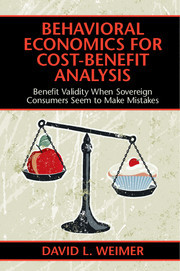Behavioral Economics for Cost-Benefit Analysis Benefit Validity When Sovereign Consumers Seem to Make Mistakes
Langue : Anglais
Auteur : Weimer David L.

How should policy analysts assess 'benefit validity' when behavioral anomalies appear relevant? David L. Weimer provides thoughtful answers through practical guidelines.
How should policy analysts assess 'benefit validity' when behavioral anomalies appear relevant? David L. Weimer provides thoughtful answers through practical guidelines. Behavioral economists have identified a number of situations in which people appear not to behave according to the neoclassical assumptions underpinning welfare economics and its application to the assessment of the efficiency of proposed public policies through cost-benefit analysis. This book introduces the concept of benefit validity as a criterion for estimating benefits from observed or stated preference studies, and provides practical guidelines to help analysts accommodate behavioral findings. It considers benefit validity in four areas: violations of expected utility theory, unexpectedly large differences between willingness to pay and willingness to accept, non-exponential discounting, and harmful addiction. In addition to its immediate value to practicing policy analysts, it helps behavioral economists identify issues where their research programs can make practical contributions to better policy analysis.
1. Introduction; 2. Neoclassical valuation principles for CBA; 3. Possible behavioral frameworks for CBA; 4. Risk perception and expected utility deviations; 5. Large deviations between WTP and WTA; 6. Non-exponential time discounting; 7. Harmful addictive consumption; 8. Practical guidelines for valuation.
David L. Weimer is the Edwin E. Witte Professor of Political Economy at the University of Wisconsin, Madison. He is the author of numerous articles and monographs on health policy and policy craft, as well as the co-author of two texts that have made important contributions to public policy education: Policy Analysis: Concepts and Practice, 6th edition (forthcoming) and Cost-Benefit Analysis: Concepts and Practice, 4th edition (2014). A Fellow of the National Academy of Public Administration, he served as President of the Association for Public Policy Analysis and Management in 2006 and President of the Society for Benefit-Cost Analysis in 2013.
Date de parution : 09-2017
Ouvrage de 178 p.
15.2x22.8 cm
Date de parution : 09-2017
Ouvrage de 176 p.
15.6x23.5 cm
Thème de Behavioral Economics for Cost-Benefit Analysis :
© 2024 LAVOISIER S.A.S.



